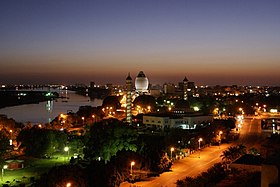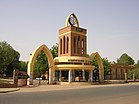
Back Khartoum ACE Khartoem Afrikaans ካርቱም Amharic Khartum AN الخرطوم Arabic الخرطوم ARZ Ḥartum AST Khartoum AVK Xartum Azerbaijani خرطوم AZB
Khartoum
الخرطوم | |
|---|---|
From top: night view of Khartoum, Khartoum Mosque, the University of Khartoum, and the El Mek Nimr Bridge. | |
| Nickname: "Triangular Capital" | |
| Coordinates: 15°36′N 32°30′E / 15.6°N 32.5°E[1] | |
| Country | |
| State | Khartoum |
| Area | |
| • Capital city | 1,010 km2 (390 sq mi) |
| Elevation | 381 m (1,250 ft) |
| Population | |
| • Capital city | 639,598 |
| • Urban | 6,017,000 |
| • Metro | 6,344,348 |
| Demonyms | Khartoumese, Khartoumian (the latter more properly designates a Mesolithic archaeological stratum)[clarification needed][citation needed] |
| Time zone | UTC+02:00 (Central Africa Time) |
| • Summer (DST) | (Not Observed) |
Khartoum or Khartum (/kɑːrˈtuːm/ kar-TOOM;[5][6] Arabic: الخرطوم, romanized: al-Khurṭūm, pronounced [al.xur.tˤuːm]) is the capital of Sudan. With a population of 6,344,348, Khartoum's metropolitan area is the largest in Sudan.
Khartoum is located at the confluence of the White Nile – flowing north from Lake Victoria – and the Blue Nile, flowing west from Lake Tana in Ethiopia. Divided by these two parts of the Nile, the Khartoum metropolitan area is a tripartite metropolis consisting of Khartoum proper and linked by bridges to Khartoum North (الخرطوم بحري al-Kharṭūm Baḥrī) and Omdurman (أم درمان Umm Durmān) to the west. The place where the two Niles meet is known as al-Mogran or al-Muqran (المقرن; English: "The Confluence").
Khartoum was founded in 1821 by Muhammad Ali Pasha, north of the ancient city of Soba. In 1882 the British Empire took control of the Egyptian government, leaving the administration of Sudan in the hands of the Egyptians. At the outbreak of the Mahdist War, the British attempted to evacuate Anglo-Egyptian garrisons from Sudan but the Siege of Khartoum in 1884 resulted in the capture of the city by Mahdist forces and a massacre of the defending Anglo-Egyptian garrison. In 1898 it was reoccupied by British forces and was the seat of Anglo-Egyptian Sudan's government until 1956.[7]
In 1956, the city was designated as the capital of an independent Sudan. Three hostages were killed during the attack on the Saudi Embassy in Khartoum in 1973.
In 2008, the Justice and Equality Movement engaged in combat in the city with the Sudanese Armed Forces as part of the War in Darfur. The Khartoum massacre occurred in 2019 during the Sudanese Revolution. The city saw extensive combat during the 2023 Sudan conflict between the armed forces and the Rapid Support Forces (RSF), affecting Khartoum International Airport and other critical sites.[8]
Khartoum is an economic and trade center in North Africa, with rail lines from Port Sudan and El-Obeid. It is served by Khartoum International Airport with the New Khartoum International Airport under construction. Several national and cultural institutions are in Khartoum and its metropolitan area, including the National Museum of Sudan, the Khalifa House Museum, the University of Khartoum, and the Sudan University of Science and Technology.
- ^ a b "Where is Khartoum, The Sudan?". worldatlas.com. 2018. Archived from the original on 29 January 2018. Retrieved 28 January 2018.
- ^ "Sudan: States, Major Cities, Towns & Agglomeration - Population Statistics, Maps, Charts, Weather and Web Information". www.citypopulation.de. Archived from the original on 12 April 2020. Retrieved 11 September 2021.
- ^ "Sudan Facts on Largest Cities, Populations, Symbols - Worldatlas.com". www.worldatlas.com. 7 April 2017. Archived from the original on 9 February 2018. Retrieved 9 February 2018.
- ^ Demographia World Urban Areas (PDF) (17th ed.). Demographia. May 2021. p. 42. Archived (PDF) from the original on 5 August 2011. Retrieved 8 May 2021.
- ^ "Khartoum". Dictionary.reference.com. Archived from the original on 6 December 2012. Retrieved 28 November 2012.
- ^ "Khartoum". TheFreeDictionary.com. Archived from the original on 10 September 2012. Retrieved 28 November 2012.
- ^ "Khartoum | Location, Facts, & History". Encyclopedia Britannica. Archived from the original on 26 June 2015. Retrieved 28 April 2020.
- ^ Leiro, Roberto (15 April 2023). "Sudan's RSF Clashes with Army in Khartoum Airport". Airways. Archived from the original on 16 April 2023. Retrieved 16 April 2023.






